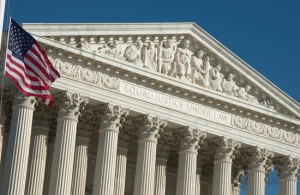
By David G. Savage, Tribune Washington Bureau –
WASHINGTON — The Supreme Court will weigh in on the controversy over voter fraud and decide early next year whether Arizona can require residents to show proof of their citizenship before they register to vote.
The justices agreed to hear Arizona’s appeal of an anti-fraud provision that was adopted as a ballot initiative in 2004, but was struck down by the 9th U.S. Circuit Court of Appeals.
Without this provision, “Arizona is forced to accept what amounts to an honors system as to whether the applicants are citizens or not,” said the state’s Attorney General Thomas C. Horne. He was referring to the federal “motor voter” law that allows people to register to vote in federal elections by filling out a card and simply signing a certification that they are indeed citizens eligible to vote.
In the past two years, legal battles have been fought in several states over new laws that would require registered voters to show proof of their identity before casting a ballot. Typically, these laws require a photo ID card or other documents that would verify the voters’ identity. Critics of these provisions have said there is no evidence of people seeking to cast a ballot by impersonating another person at a polling place.
The disputed Arizona provision, by contrast, focuses on the process for registering to vote, and it tries to prevent non-citizens and illegal immigrants from having their names added to the voter rolls. In its legal papers, the state pointed to examples of several non-citizens who had registered and voted in the past.
The Supreme Court will hear the Arizona case early next year and try to resolve a conflict between two laws, one federal and one state.
President Bill Clinton signed the National Voter Registration Act, known as the Motor Voter Act, into the law in 1993. It was intended to make it easier for Americans to register to vote, including when they update their driver’s license. Voter rolls are kept by counties and states. The new federal law sought to simplify the process by letting “eligible citizens” fill out a voter card after which they would be added to the rolls.
But in 2004, Arizona’s voters adopted Proposition 200, which was intended to prevent illegal immigrants from registering and voting. State residents were told that if they wanted to register to vote, they must submit proof of their citizenship. They could do that by showing an Arizona’s driver’s license, a U.S. passport, a birth certificate or naturalization documents.
This provision has not gone into effect, however. In 2006, the 9th Circuit Court blocked the proof-of-citizenship requirement, but the Supreme Court intervened and set aside its temporary injunction. “The state indisputably has a compelling interest in preserving the integrity of its election process” and in preventing “voter fraud,” the high court said then in a brief unsigned opinion.
Several voting-rights groups persisted and pressed for a full trial on the argument that the state’s extra requirements for registering to vote conflicted with the procedure set in the Motor Voter Act. They lost before a federal judge.
Two years ago, when the case again reached the 9th Circuit, a three-judge panel that included retired Supreme Court Justice Sandra Day O’Connor, agreed with the challengers and ruled the state law was pre-empted or trumped by the federal law. That decision in turn was affirmed by the full 9th Circuit. The Constitution itself says the “times, places and manner of holding elections for Senators and Representatives shall be prescribed in each state … but the Congress may at any time by law make or alter such regulations.”
The 9th Circuit majority concluded Congress had altered the voter registration rules, and the states were obliged to follow its lead.
Arizona’s lawyers appealed to the Supreme Court earlier this year, arguing that voting in federal elections should be restricted to citizens only. They said that since Congress wanted only “eligible citizens” to register, its proof-of-citizenship rule complied with the federal law.
Four other states — Georgia, Alabama, Kansas and Tennessee — have enacted similar laws requiring would-be new voters to show a proof of citizenship, the court was told.
The Arizona law is not in effect this year. The justices voted to hear the case of Arizona vs. InterTribal Council, to decide the issue by next June.








